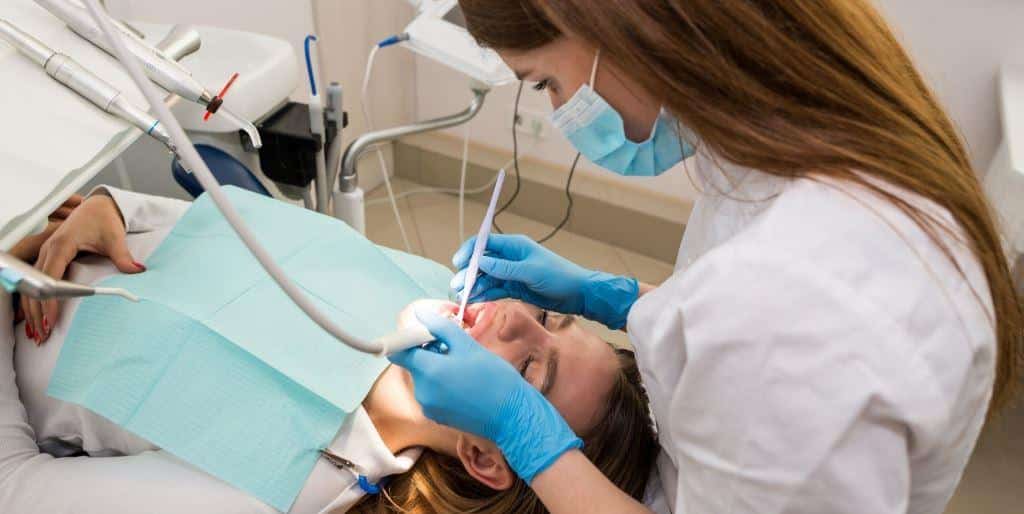If you have recently undergone treatment for periodontal disease or have undergone mechanical trauma, you will certainly be interested in the topic of tooth splinting in the UK. This painless dental procedure will help you enjoy a beautiful smile without worrying about your oral health, and can significantly delay the time when you need dentures.
Read what exactly it consists of, when it is necessary and exactly how much it costs.
Remember, loose teeth can be a sign of a serious disease such as periodontitis. If you notice worrying symptoms in yourself, it is essential to contact your dentist. If you are unsure, read our article: "Periodontitis - causes, symptoms and treatment of periodontitis in the UK".
What does tooth splinting involve?
Disordered teeth severely reduce the quality of life. They make it difficult and in some cases even impossible to eat freely! Fortunately, there is a treatment that helps to deal with the problem.
Tooth splinting in the UK involves connecting loose teeth by means of a suitable material. The smile is strengthened, the force you use to chew is spread across the entire arch and the teeth stop "wandering".
The dentist will place splints, made of fibreglass or composite, in your mouth. Don't worry - they won't bother you. Properly applied, they will not be felt, and also - they are invisible to the eye. The splints are fixed on the lingual or palatal surface of the teeth.
You need to know that before the dentist can proceed with the procedureIf you are undergoing a dental hygiene procedure, you will need to have your teeth cleaned. This involves the removal of tartar and plaque from the teeth. We have elaborated on this in detail in one of our articles: "Dental hygiene in the UK - scaling, tooth sandblasting, polishing and fluoridation".

Are splints on teeth permanently fitted?
Tooth splinting in the UK can, of course, be a temporary solution - for example, if a patient has chewing problems or has undergone periodontal surgery.
However, if your case requires fixed rails, you don't have to worry about that. As we mentioned earlier, they are undetectable and invisible. They can also be in a removable form.
When is tooth splinting necessary?
As we mentioned earlier, the fitting of splints may be necessary if you have recently been treated for periodontal disease (periodontitis) or have undergone mechanical trauma. However, these are not the only reasons to opt for this procedure. Often dentists recommend it during orthodontic therapies or in the healing process after other treatments.
Teeth splinting in the UK is also a great option for dealing with bruxism. This is one ailment whose causes are not fully known, so it is difficult to combat.
Teeth grinding can lead to tooth loosening, so splinting may also be necessary in this case. Remember to act quickly as soon as you notice worrying symptoms in yourself. We encourage you to read our article: "Bruxism, or teeth grinding - where does it come from and how to get rid of it?", where you can find out more about this ailment.

What should you watch out for?
You need to be aware that you may find it difficult to take good care of your oral hygiene after splinting your teeth. Why? The gaps between the filling and the teeth are too narrow to clean properly, and food debris can still appear there.
What can splinting teeth in the UK result in? Most commonly the development of tooth decay. However, you don't have to worry - all you need to do is make sure you visit your dentist regularly and he will certainly be able to remedy any ailments. However, if you neglect this issue, you have to reckon with the consequences.
Caries can result in pulp inflammation, which is very painful. However, this ailment will not always be associated with pain - but even then it should not be underestimated. To learn more about the disease itself and its consequences, read our article: "Tooth decay - where does it come from, how to treat and prevent it?".

How much does tooth splinting cost in the UK?
This procedure may seem a tad expensive, but it is certainly a lot less than the prosthetic solutions that will be necessary when the teeth can no longer be saved.
In our clinic, the price of tooth splinting starts from £110 (up to 2 teeth). For 3-4 teeth it is £200 and 5-6 teeth it is £300. If the treatment in your case is more than £350, you have the option to spread the amount into convenient instalments.
This is a completely safe solution that has already been used by a number of our patients. We have prepared a short guide for those interested: "Teeth on credit: dental treatment on hire purchase". Important, our system in 100% safe and regulated by the Financial Conduct Authority (FCA number 619628)
Remember - regular visits to the dentist are key, to take proper care of your oral health. Many ailments can be prevented or treated at a very early stage, resulting in shorter treatment times and lower overall costs. Time is definitely not an ally here! Call usto make an appointment now.

